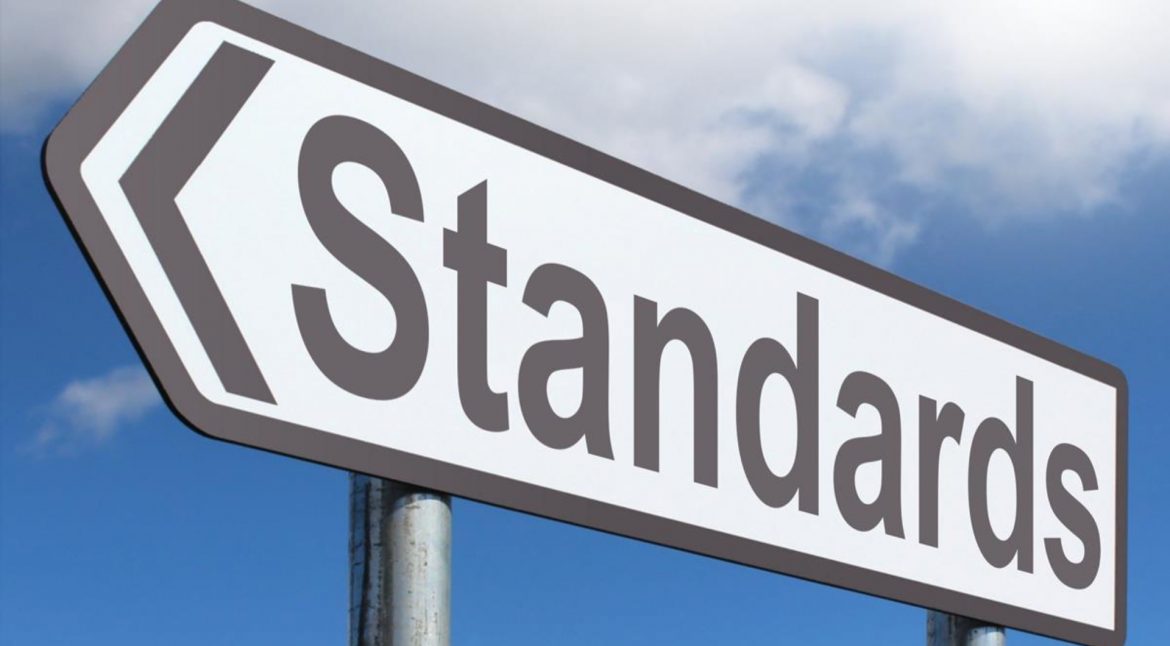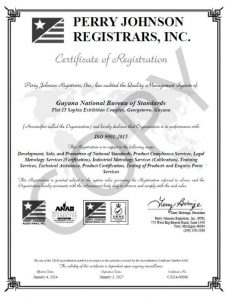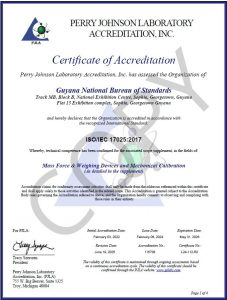Guyana joins other CARICOM Member states to observe CARICOM Day as a national holiday on Monday, July 01. This grouping of fifteen Member States and five Associate members plays an important role in foreign policy coordination, human and social development, and fostering economic integration & trade, through its various organisations.
One such organisation is the CARICOM Regional Organisation for Standards and Quality (CROSQ) established in February 2002 to facilitate the development of regional standards, promote the harmonization of metrology systems and support the sustainable production and trade of goods and services in the CARICOM Single Market and Economy (CSME). Supported by the Regional Governments, CROSQ also promotes the development of National Standards Bodies (NSB) in the Member States and facilitates access to technical assistance available in and outside of the Region.
The Guyana National Bureau of Standards (GNBS), the leading NSB within CROSQ, assists with the development and revision of Regional Standards. The GNBS also provides technical assistance to other NSBs looking to implement and provide new services within their respective Member states in the areas of verification, certification, calibration, testing, among others.
Currently, the GNBS is working with at least eight committees on new Regional Standards relating to the Specification for Compost, Requirements for Nutritional Labelling on pre-packaged goods, Sampling of Cocoa Beans, Specification for Biodegradable Products, Specification for Rum, and Hazardous substance or related products among others. The Bureau’s role on these committees includes organizing meetings and providing research materials to lead the process, sourcing local experts on the various topics to contribute to the standards development process. It also communicates with relevant agencies, enforcement bodies and other stakeholders to provide feedback on the standards, and much more.
Regional Standards are used for trade, regulatory purposes and as industry guides for products, services and process quality. These standards further assist with the implementation of the WTO (World Trade Organisation) Agreement that deals with Technical Barriers to Trade (TBT), which was signed by most CARICOM Member States. With Regional Standards, the aim is to reduce the incidence of standards and regulations being used as barriers to trade.
Over the years, the GNBS has also adopted various Regional Standards to help local stakeholders meet regional requirements for numerous products and services. Some of those standards which were adopted include CRS 26: 2013 – Labelling of Tobacco products, CRS 39:2022 – Pesticides labelling – requirements and the CRS 76:2023 Hand sanitizers – Alcohol-based hand sanitizers – specifications. These standards are now affixed with Guyana Standard numbers – GYS 9-3: 2014, GYS 590:2024 and GYS 598:2024 respectively. There are also several standards for fresh agricultural produce which were adopted by the GNBS and other Member States to facilitate trade in the agriculture sector across the region.
In addition, regional standards covering ‘Sustainable tourism’ such as the sewage treatment and management requirements, integrated pest management systems requirements, energy management and efficiency requirements, and solid waste management – requirements of sweet potatoes were also adopted. Stakeholders can propose the adoption or development of a regional standard via the GNBS.
Aside from standards development, through regional projects, CROSQ also supports NSBs to implement other components of internationally recognised quality infrastructure (QI) which include Conformity Assessment (Testing and Certification), Accreditation and Metrology, to meet requirements and satisfy domestic and global demands. These components of QI, which are necessary for bilateral and multilateral trade, are particularly important for developing countries like those in the Caribbean that need to build and grow their production sectors. The GNBS has been at the forefront in delivering QI services to ensure the competitive advantage of local businesses and firms.
Finally, as we prepare to celebrate CARICOM Day tomorrow, Monday July 01, let us all focus on the positive outcomes of CARICOM including strides made in the area of Regional Standardisation. We should all be proud. #WeAreCARICOM
For further information on this subject, contact the GNBS on telephone numbers: 219-0064 or 219-0065 or WhatsApp us on 692-4627.






